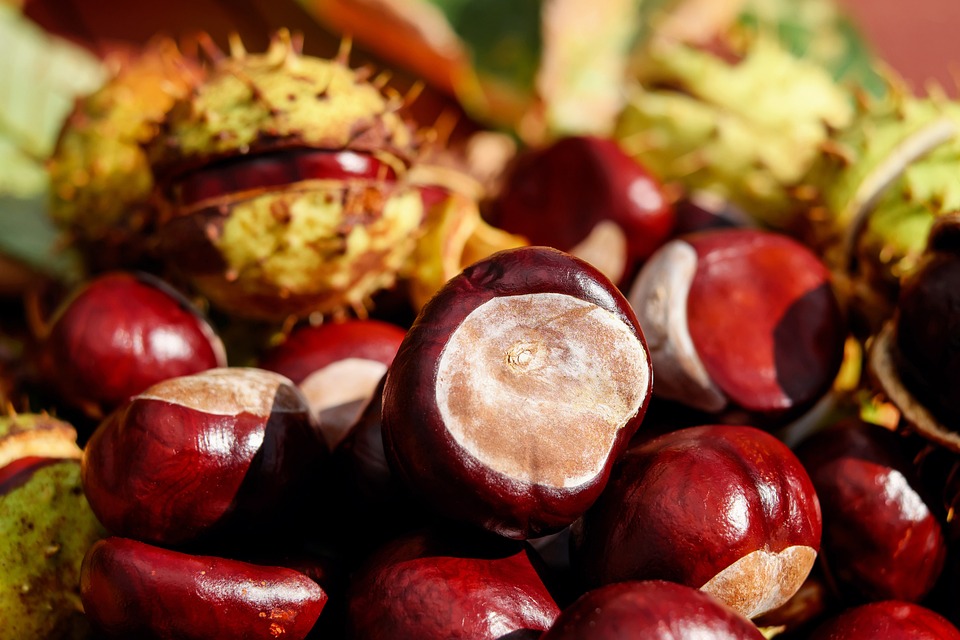Fresh off the tree, the skin looks a little prickly and tough, but sweet chestnuts are super tasty and healthy!
It is said that sweet chestnut trees can live up to 400 years. Therefore, the tree can reach a canopy height of 15 to 30 meters. Sweet chestnuts bloom in the summer (June-July); they begin to drop their leaves around October.
Main Properties of Chestnuts
Let us now analyze the main properties that make chestnuts healthy and why it can be included in the diet.
• It is ideal for those deficient in red blood cells and B vitamins, as it is rich in these vitamins and folic acid, which are essential for energy production and the growth and formation of red blood cells.
• It is an excellent source of copper, manganese, and phosphorus, and a good source of potassium, which is essential for muscle function, and sulfur, which aids the liver.
• It is also a good source of calcium, which is essential for the skeletal and nervous systems.
• It is rich in dietary fiber, which is excellent for intestinal function.
• Chestnut flour can be used in many recipes, including gluten-free desserts, making it a suitable alternative to excessive wheat flour intake.
• As such, chestnuts are ideal for children and sportsmen because they contain nutrients such as B vitamins, phosphorus, and iron and are rich in carbohydrates. They are also suitable for pregnant women because they contain folic acid, minerals, and carbohydrates, essential for children’s growth and development.
• Beneficial for heart health: chestnuts contain nutrients that are good for the heart.
• First, they contain antioxidants such as gallic acid and ellagic acid. Studies have shown that these antioxidants help protect the heart from oxidative stress, which increases the risk of stroke and heart diseases.
• Chestnuts also contain potassium, which provides 11% of the daily requirement. Potassium is essential for a healthy heart and helps regulate blood pressure.
• Furthermore, studies have shown that a diet high in potassium can reduce the risk of heart disease by 27% and stroke by 24%.
• Inflammation can be reduced: inflammation is a natural process that fights infection and helps the body heal.
• In some situations, inflammation may remain at low levels. This is called chronic inflammation and has been associated to a multitude of chronic diseases, including heart disease, diabetes, and cancer.
• Chestnuts contain antioxidants such as vitamin C, gallic acid, ellagic acid, and various polyphenols, all of which are expected to suppress inflammation. It also neutralizes free radicals, which are a major cause of chronic inflammation.
Cooking and Storage Tips
There are several ways to use chestnuts in cooking, including roasting them in a pan.
• First, cut the chestnuts open.
• Soak them in cold water for at least 20 minutes s
• Finally, place them in a pan suitable for roasting
• Roast them, first over high heat for a few minutes, then with the pan covered, over low heat for 25 to 30 minutes.
• Your roasted chestnuts are ready!
Chestnuts that have not been used for cooking can be stored in a burlap or paper bag in the refrigerator’s vegetable compartment for up to one month. Those that have already been roasted can be stored in the freezer for up to six months.

Note:
When consumed in large quantities, chestnuts can cause metritis. Therefore, it is recommended that they be introduced in small amounts to avoid excessive intestinal gas.
Chestnuts are not recommended for people suffering from diabetes, aerobia, or colitis as well. Note that chestnuts contain 250 kcal per 100 g. If you are overweight, please consult your doctor before consuming it. Otherwise, healthy people have no problem eating chestnuts. In fact, chestnuts is said to be an ideal addition to the diet of people with celiac disease and can even be consumed daily. They are considered a natural, gluten-free food.
Do you like chestnuts? Let us know in the comments below!



Pingback: Insomnia: Causes, Types, And Treatments – Hello sites
Pingback: How To Ensure That A Drug Is Authorized In France? – Hello sites